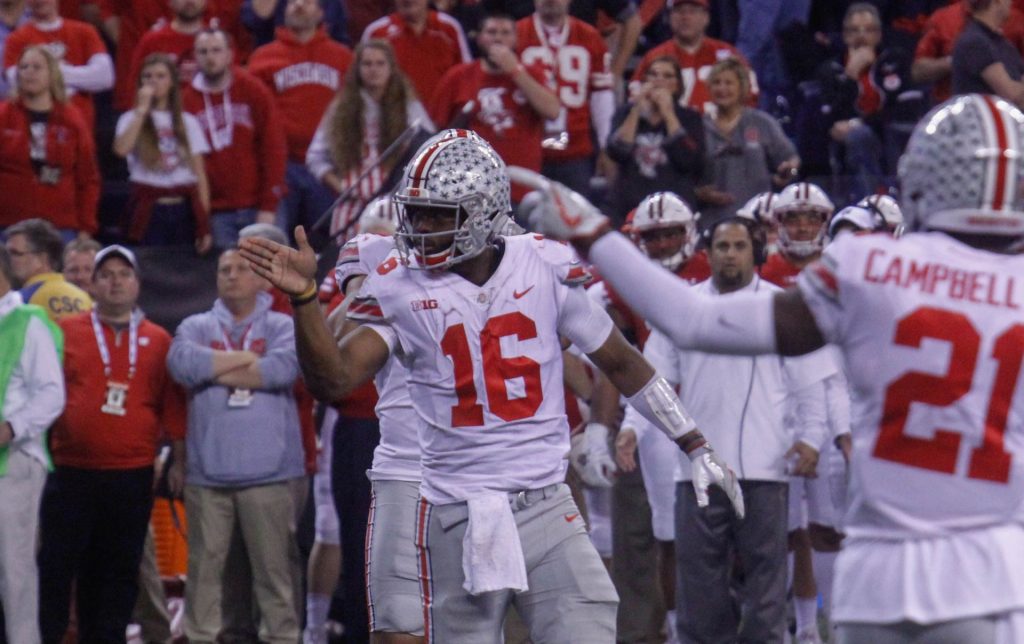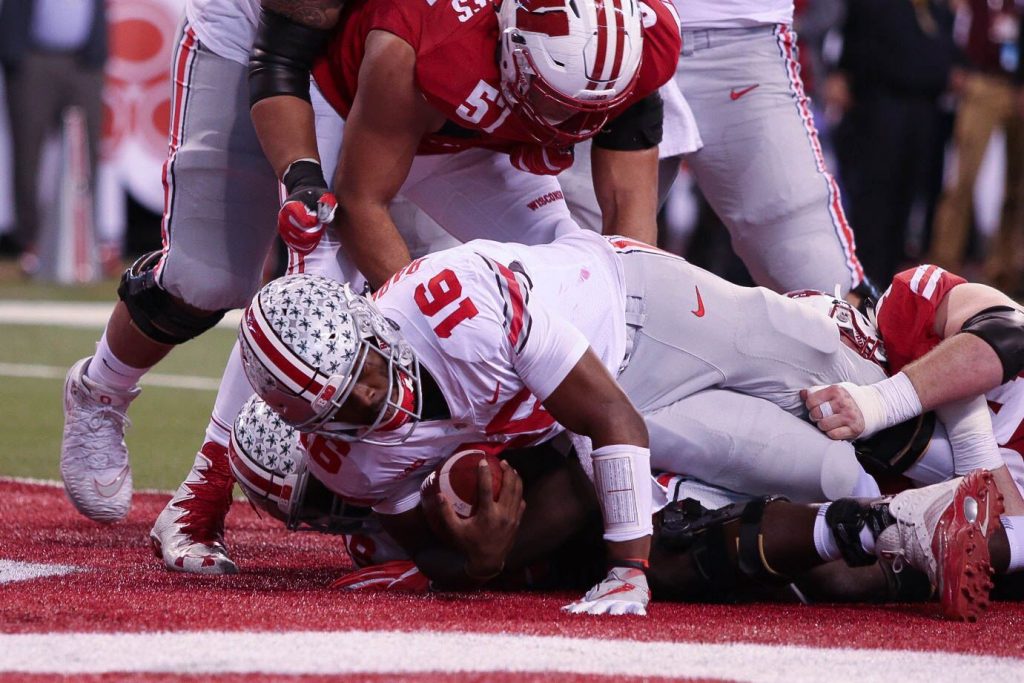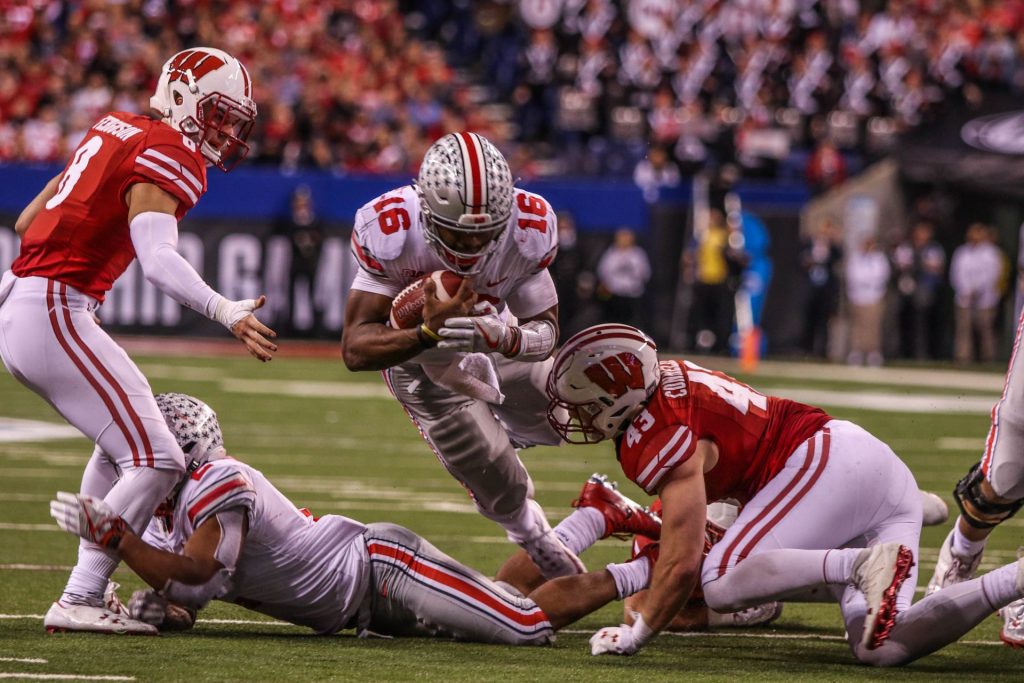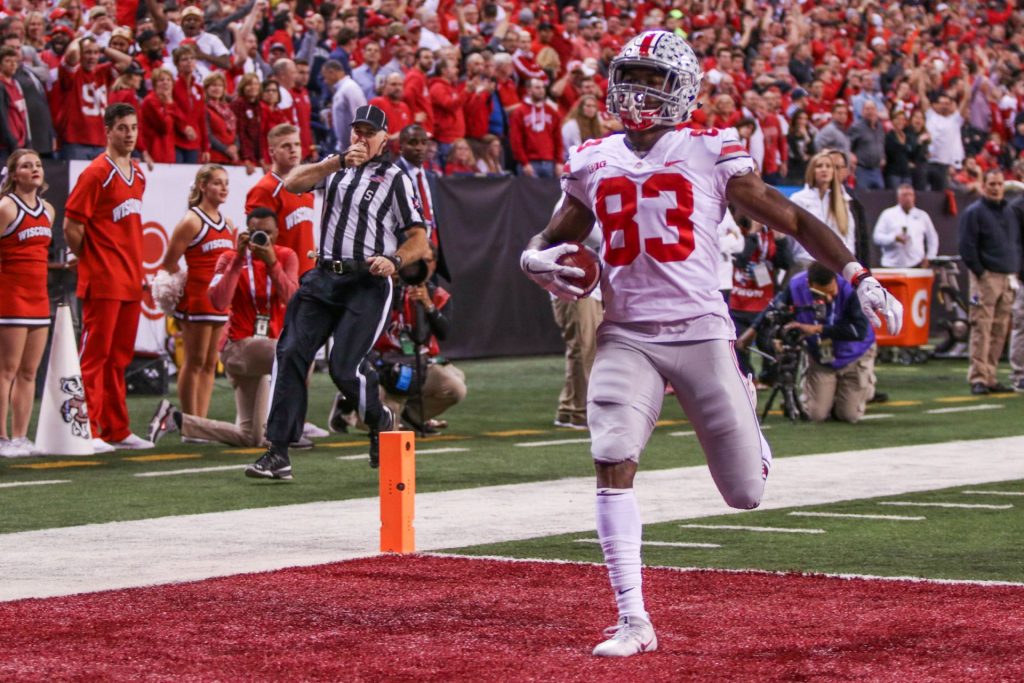
Ohio State redshirt senior quarterback J.T. Barrett (16) signals a first down in the fourth quarter of the B1G Championship game against Wisconsin on Dec. 2 in Lucas Oil Stadium. Ohio State won 27-21. Credit: James King II | Sports Director
INDIANAPOLIS — Staring at a packed defensive line and an empty backfield, Ohio State’s drive hinged on J.T. Barrett. The situation: fourth-and-1 with seven minutes left on Wisconsin’s 13-yard line with Ohio State clinging to a narrow 24-21 lead.
Barrett took the snap and rushed right into a defender behind the line of scrimmage. Wisconsin fans in the stands and players began to celebrate, but the play was not over. Barrett pushed on.
Leaning on a knee that had surgery just six days ago, he spun free of the defender, bounced to the outside and willed himself to the first-down marker.
“That was a very tough call. Offensive line wanted to go for it,” head coach Urban Meyer said. “But we’re up by three. If we do not, that gives them life. I’ve just been on the other side of that ball, all you need is a field goal to tie the game as opposed to you need a touchdown.”
Barrett was not fully healthy. The knee that helped him spin out of the defender’s grasp had forced him to leave the team’s last game against Michigan with a knee injury and required surgery the following day.

Ohio State redshirt senior quarterback J.T. Barrett (16) crashes in a touchdown in the second quarter of the B1G Championship game against Wisconsin on Dec. 2 in Lucas Oil Stadium. Ohio State won 27-21. Credit: Jack Westerheide | Photo Editor
Six days later, Barrett proved one healthy leg was all he needed to propel the No. 8 Buckeyes to the 27-21 victory in the Big Ten championship game against No. 4 Wisconsin. He finished 12-for-26 for 211 passing yards, two touchdowns and two interceptions, while rushing 19 times for 60 yards for one touchdown.
After the team’s win against Michigan last week, Barrett said he would be ready to start despite uncertainty expressed by Meyer. He made sure he stayed true to that statement.
“I said I was going to play next week,” Barrett said Saturday. “So if I didn’t, I was kind of going to be a liar. And I wouldn’t lie.”
Having the arthroscopic surgery the following day was not an option, the quarterback said. It was a requirement.
“I really couldn’t straighten my leg out being my meniscus popped out,” Barrett said. “But I mean, it was just a small procedure, really. And then just a lot of treatment. A lot of time in the training room. Tried to do my best to get my mental reps through film and then out there on the field as well so I’d be able to play today.”
Barrett spent a minimum of 15 hours with the training staff, Meyer estimated. Meyer said after the surgery, his return was a step-by-step process and that by Thursday, the team knew he would be ready to go. That itself was remarkable considering all he had been through. Meyer said only one other player had come back within a week from that similar surgery and played.
But he said there was never any doubt in his mind Barrett would start.
“How you keep him out of a game, I just don’t know how it happens,” Meyer said.
Redshirt senior center Billy Price said during the week in an effort to alleviate some of the potential pressures put on Barrett’s injury, Barrett spent time watching tape rather than fully participating in the physical warmups of practice. Barrett added that it wasn’t until Friday, the morning the team left for Indianapolis, that he even had any practice running.

Ohio State redshirt senior quarterback J.T. Barrett (16) dives for a first down in the fourth quarter of the B1G Championship game against Wisconsin on Dec. 2 in Lucas Oil Stadium. Ohio State won 27-21. Credit: Jack Westerheide | Photo Editor
“I took about half the Thursday reps in practice. And I was mainly throwing the football. Didn’t run at all,” Barrett said. “And then yesterday before we took the bus ride here, I did a whole bunch of cutting and planting on my knee. And I had confidence in my ability to go out there. So it wasn’t like I was second-guessing at all.”
When game time rolled around, the uncertainty over Barrett’s ability to start was not in question. But the players and coaches collectively held their breath whenever he would take a big hit.
“Whenever he hits the ground, I want to be the first one over there to be, ‘Hey, are you OK? Everything good? Let’s get to the next play,’” Price said. “And I don’t like people hitting him anyway, so it’s an aspect of checking on your man. I mean that’s my dude.”
Meyer knew he had backup quarterback Dwayne Haskins, who filled in admirably for Barrett last week against Michigan, at the ready should the need arise.
It did not.
Though Haskins was seen frequently warming up on the sideline, Barrett maintained his grip on the starting role from the opening snap until when he planted that injured knee on the ground in the victory formation in the game’s final seconds.
It appeared early on that his injury was hampering his performance. The dual-threat quarterback appeared to wait in the pocket for receivers to be open down field far more often than normal and his speed appeared just a notch below normal.
On his team’s first drive of the game, he escaped the pocket to the left for two yards before being tackled. However, there was plenty of open space and a healthy Barrett likely would have made it closer to, if not all the way, to the first-down marker.
But he seemed to turn all questions around fast. In the quest for his first-ever Big Ten title at the helm, Barrett turned things around on his next drive. Junior wide receiver Terry McLaurin caught an 84-yard touchdown pass deep down the field and outran defenders for a touchdown. The next drive, Barrett found H-back Parris Campbell, who hauled in a short pass and took it to the house for the 57-yard score.

Ohio State junior wide receiver Terry McLaurin (83) runs the ball in for a touchdown in the first quarter of the B1G Championship game against Wisconsin on Dec. 2 in Lucas Oil Stadium. Ohio State won 27-21. Credit: Jack Westerheide | Photo Editor
“The open pass to start the game to Terry McLaurin was a great pass,” Meyer said. “We caught them in zero hold coverage and it was a big hit. And Parris came out the end of the other bubble. Whenever you play zero hold coverage, if you break your tackle you come out the other end.”
Barrett had two other chances to hit wide-open receivers for additional scores in the second quarter when H-back K.J. Hill and wide receiver Johnnie Dixon both found themselves with space behind the Badgers’ defense. Twice, Barrett overshot his intended targets.
“We left a lot of yardage on the field,” Meyer said. “We had some misfires in the throw game that were — guys were wide open. But I thought we adjusted fairly good against one of the top defenses in the country. Still had 450 yards of offense, but there was a lot of offense on the field.”
Despite the mistakes Barrett made Saturday, he did enough for Ohio State to win the game. He was not the MVP of the game. But Ohio State had several moments when its offensive leader did exactly what was needed.
Barrett wanted to start Saturday, but was dealing with an injury. So he willed himself to start. Barrett wanted the first down on that crucial play in the fourth quarter. So he willed himself to the first-down. Barrett wanted the Big Ten championship game. So he willed himself to win.


